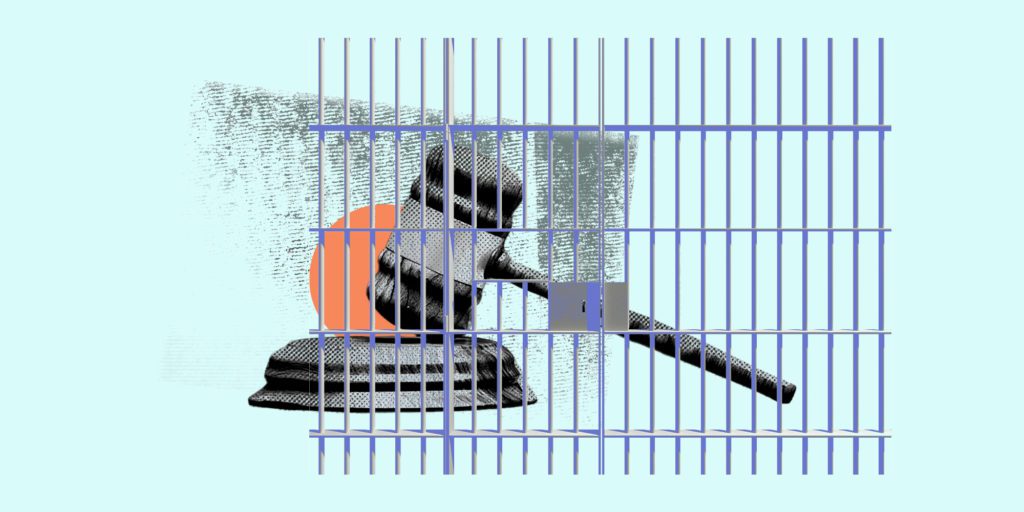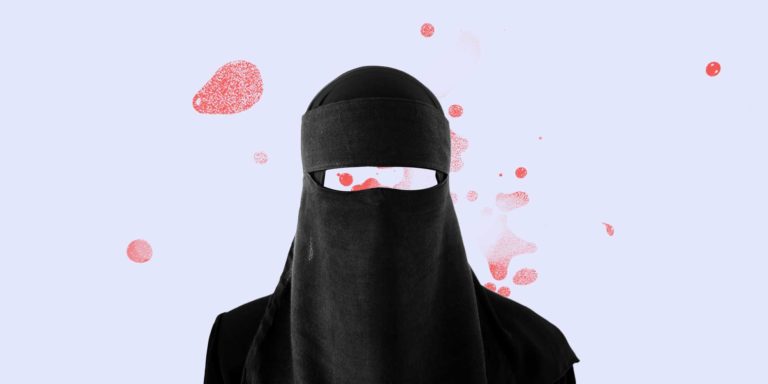Egyptian film director Islam al-Azazi filed charges against Egyptian journalist, writer and human rights activist Rasha Azab, accusing her of slander. She had expressed solidarity with the six women who accuse him of sexual abuse.
In December, Daftar Hekayat, an Arabic blog sharing stories of sexual violence of survivors in their own words, published the first (anonymous) allegation against Azizi. Five others followed with horrific details about the abuse. One woman even claimed to have been raped. The women are only known by their initials.
“On charges of insulting and slandering Islam al-Azazi, who stands accused of six cases of rape and harassment, I was referred to a speedy trial in line with the principle of fast justice in our country,” Azab told Daraj. “However, despite a number of testimonies regarding the case, the Public Prosecutor has so far not conducted any investigations. The law stands by the perpetrator without knowing the reasons for the so-called insult and slander.”
Azab refused to use any of the testimonies against Al-Azazi to support her case.
“I support anonymity in the light of the unfair conditions of the justice system,” she said. “I do not want to put anyone at risk.”
Amnesty International on March 12 came out in full support of Azab.
“The Egyptian authorities must immediately put an end to the shameful prosecution of Rasha Azab, a journalist and writer, who is on trial for her outspoken support for survivors of sexual violence,” the human rights organization said in a statement.
Solidarity with Rasha
A solidarity campaign was organized on Facebook and Twitter, denouncing putting activists on trial for standing with victims of sexual violence. Activists attended the hearings on February 26 and March 12. In addition, to a campaign in support of Rasha, feminism and human rights was launched on a regional and global level.
“The goal of the solidarity campaign is to defend an idea,” said Azab. “Imprisoning or fining me will mean preventing women in the future from defending and showing solidarity with victims of sexual violence.”
“Some people feel in danger,” she continued. “We all feel danger seeing this kind of law enforcement, which prosecutes women because of them showing solidarity with survivors of sexual violence.” Meanwhile, women’s rights such as their right to divorce or sue, even in cases of electronic extortion, are abused. And if a woman dares complain, she will face a lot of difficulties in case she brings a report to court. It is a great torment. Investigations can continue for a year and then the case is just closed.”
The Regional Coalition for Women Human Rights Defenders in the Middle East and North Africa called on organizations to stand with Rasha Azab. It issued a statement that was signed by over 20 Egyptian, Arab and international organizations.
“In recent years, the voices of feminists and activists in the region have risen, from silence-breakers and pioneers who reveal of what is happening to believing in the ability of feminists, women and individuals in solidarity, rejecting aggressors and putting pressure on institutions concerned to hold aggressors accountable, and believing in the ability of women to change their fate and destiny,” the statement reads.
“Protecting one another, as feminists, feminist organizations and individuals involved in safety and security of the community is an essential step in protecting survivors and safety nets that help them recover and overcome violence.”
According to Azab, the solidarity campaign highlighted the testimonies of other women who accused men of extortion. Tracing the path of such cases in the prosecutors’ offices and courts shows the mechanism by which males usually escape from their crimes.
“We women feel the danger, which is common in dealing with many of these issues,” she said. “In addition to the desire that crimes of harassment and sexual exploitation do not go unpunished. That is why we talk about these issues. That is our battle.”
Azab’s defense team said in a press statement after her trial that she submitted the texts of the six testimonies that were published by Daftar Hekayat, as well as an official copy of the charter for equality between women and men in cinematic events, and an authorization to extract an official statement from the General Federation of Technical Syndicates on actors (casting) tests.
Read Also:
Al-Azazi’s Revenge
Islam Al-Azazi is the director of the movie About Her, which recently premiered on the Cairo Film Festival and, ironically, deals with women’s issues. He responded to the allegations by asking the women to file formal charges against him.
“The testimonies [against me] that were published yesterday and today, to which some linked my name, are full of falsehoods and slander,” he wrote on his Facebook page. He emphasized his accusers should take the necessary measures in order for an official investigation to take place.
With a painful smile, Mona, (a pseudonym), who wrote one of the stories published on Daftar Hekayat explains that the reason for not resorting to the law, what Azazi calls for, is that victims of sexual violence are subjected to stigmatization, in addition to facing enormous difficulties proving accusations of harassment.
Sexual exploitation may even turn the girl into the defendant and the criminal into the victim under the pretext of being defamed. And the law simply does not protect women.
“I will not be a scapegoat for a society looking for scandals,” said Mona. “I am only looking for recovery. So, I posted on the blog.” “I thought about going the legal path,” she continued. “But thank God I did not. Especially when I saw how the comments under my testimony were attacking, insulting and accusing me, instead of the criminal. But I also found solidarity and support that helps me recover now.” Like Mona, the other victims of Al-Azazi chose not to resort to the judiciary. But in return he decided to wage a legal war.
Threat of Imprisonment
Amnesty International indicated that if convicted, Azab could face up to two years in prison or a fine of up to 50,000 Egyptian pounds ($3,200). As such, expressing solidarity with victims of sexual violence sends a shocking message that women must suffer in silence, and refrain from seeking justice and compensation for rape, sexual abuse and harassment.
“Amnesty International research shows that the Egyptian authorities often fail to prevent and investigate widespread violence against women and girls,” said Philip. “Instead, the authorities have threatened, arbitrarily detained and prosecuted victims, witnesses and activists who dare report or campaign against sexual violence.”
Read Also:







